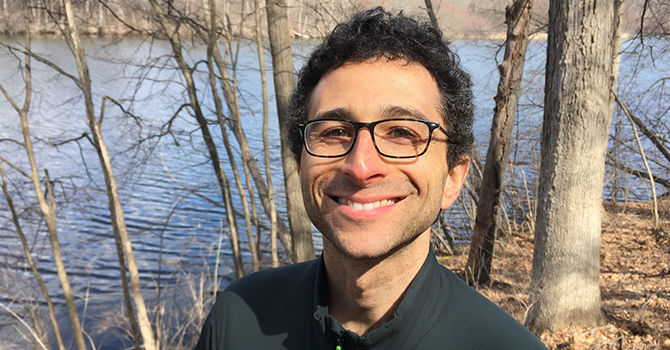Using Technology and Collaboration to Combat Cancer

Brian Segal
MS ‘13, PhD ’17, Biostatistics; Data Analysis, Flatiron Health
Every morning, Brian Segal bikes from his home in Brooklyn to Manhattan. He describes
this commute over the bridge as his favorite part of New York City, culminating in
his arrival at a job that he enjoys. Brian works for Flatiron Health, a tech company
that he says, “works on cancer instead of advertising.”
The company analyzes electronic health records through a combination of technology
and medical reviewers, which produces information about cancer treatment that pharmaceutical
companies use to determine the efficiency of cancer medications and patient care.
The pharmaceutical companies then take this data and apply it to the real world. Brian
finds Flatiron’s role in this real-time data analysis exciting because the company
is, “leading the way in the industry as far as using real world data as opposed to
clinical data.”
One of the core functions of Brian’s job is to to assess how efficiently the company
is extracting information from health records. He measures the reliability of certain
aspects of their work, like information related to disease progression, as well as
how the data is being interpreted, and the ability to predict future events. The tricky
part, Brian explains, is the complexity of the health records – they contain valuable
information, but getting to that information is a challenge.
The team Brian works with addresses this challenge through collaboration. His coworkers
include biostatisticians, epidemiologists, clinicians, psychologists, physicians,
oncologists, and software engineers. The company’s open floor plan encourages discussion,
and Brian often spends his days meeting with coworkers to talk over projects. “I really
like the people I work with,” Brian says. “They’re great.” He also draws inspiration
for his work from Flatiron’s leadership, many of whom came out of academia to tackle
questions in the world of industry.
Brian finds his work at Flatiron rewarding. “It’s an exciting, fast-paced environment.
There’s potential here to actually make a difference in the long-term for cancer patient
care.” In the coming years, he plans to advance the work at Flatiron and in the statistics
community in general. His goal is to produce work that has an impact. “The projects
I’m working on actually matter for the health of populations,” he says, “which is
really important to me.“
